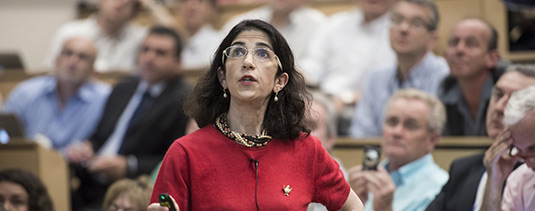In this Op-Ed published in the GS Daily Brief newsletter in the framework of GESDA’s partnership with Geneva Solutions, Fabiola Gianotti, DG of CERN and Board member of GESDA, underlines that “science is more than a source of knowledge and progress, it is also a value system.”
“This year, science has been in the spotlight as never before, and it’s instructive to look not only at the progress science enables but also at the values that it promotes. Both are crucial for the sustainable future of humanity.
Science is by its very nature transformational – a journey into the unknown requiring the highest levels of creativity, complemented by the most sophisticated of tools. As such, it’s the fuel of progress.
My own field, particle physics, is a young one, not quite a century and a quarter old, yet it has brought about huge advances in both knowledge and technology. The very first elementary particle to be discovered, the electron, first observed by British physicist J.J. Thomson in 1897, is now the lifeblood of modern society as the carrier of electricity. The Higgs boson, discovered at CERN, Geneva, in 2012 is the most recent addition to the family of elementary particles, representing the culmination of Thomson’s journey.
The Higgs boson is the last ingredient of what we call the Standard Model, which accounts for all the visible matter of the universe. It is also a new beginning, opening a door to new research and knowledge: as we continue our research, we hope that studies of the Higgs will allow us to decipher some of the remaining mysteries of the universe’s structure and evolution.
Since the beginning, the tools of particle physics have led to life-changing applications. When physicists started to develop particle accelerators for basic research, applications in medicine and industry were not far behind. One pioneer, the Norwegian accelerator physicist Rolf Wideröe, spent much of his life in Switzerland, working for the Brown Boveri Company where he built particle accelerators for cancer therapy.
CERN too contributes to advanced cancer therapy as a significant player in the development of particle beam therapy. Detector technology also has important applications in medicine going back to the 1970s, when one of the earliest PET scanners was developed through a collaboration between CERN and the Geneva Cantonal Hospital. These are just two examples of the technologies to which CERN has contributed over the years. Today, our Knowledge Transfer team manages a portfolio spanning 18 domains of technology, ranging from superconductivity to environmental protection.
In normal times, contributions like these may not be front-page news. This year has been different. Eminent virologists, immunologists and epidemiologists have graced the front pages of our newspapers as much as politicians, sportspeople and entertainers. A sustainable world requires science to remain centre-stage. Scientific knowledge can give us the means to overcome many of the societal and planetary challenges we face and bequeath a sustainable world to future generations.
Science is more than a source of knowledge and progress, it is also a value system. Science is universal and unifying. It is universal because it is based on objective facts and not opinion, and because the laws of nature are the same everywhere on earth and always have been. It is unifying because the quest for knowledge and the wish to understand how things work are aspirations and values shared by all humanity. Scientific knowledge has no passport, gender, ethnicity or political affiliation. For these reasons, science is intrinsically and inherently inclusive. When shared in an open way with everybody, science is also a powerful tool to reduce inequities within and across countries.
This is also why science is an essential component in our pursuit of the Sustainable Development Goals. Overcoming all the challenges we face will require further scientific advances and inclusive cooperation. Here, International Geneva plays an important role. Technology development and innovation, the key spinoffs of research, are placed at the service of societal challenges in close collaboration with partners throughout Geneva’s international ecosystem. The Geneva Science and Diplomacy Anticipator GESDA [a foundation dedicated to science and diplomacy anticipation], is an important bridge-builder in this regard, and there is much potential still to be tapped if we work more closely together.
Even though 2020 has undeniably been a testing year, one positive outcome could be that society becomes more engaged with and supportive of science, recognising that science is not only the foundation of knowledge and progress, but also the promoter of indispensable and irreplaceable values for a sustainable world.”
Dr Fabiola Gianotti is the Director-General of CERN. From 2009 to 2013 she was the project leader of the ATLAS experiment and in 2012 she announced, together with the project leader of the CMS experiment, the discovery of the Higgs boson. Dr Gianotti has received twelve honorary doctoral degrees from universities across the world, including from the University of Geneva, and several awards, including the Special Breakthrough prize in Fundamental Physics, the Enrico Fermi prize of the Italian Physical Society and the Tate Medal of the American Institute of Physics for International Leadership. She received a PhD in physics from the University of Milano. She is a Board Member of GESDA.
Photo credit © CERN


